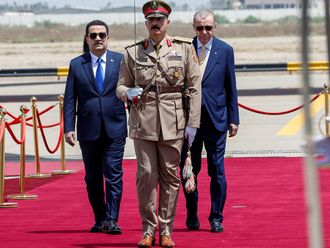London: Isil poses a smaller global threat than Al Qaida despite its recent beheadings of three Westerners, although battle-hardened fighters returning home remain a concern, analysts said on Thursday.
Analysts at the International Institute for Strategic Studies (IISS) think-tank in London warned against overestimating the threat.
“Despite its spectacular acts of violence, including against Westerners, (Isil’s) short- and medium-term objectives appear to be local and transnational rather than global,” the institute said in its annual report.
Middle East expert Emile Hokayem told a press conference that the Isil organisation’s “very ambitious” goal to create a fully-functioning Isil may be at odds with its ability to continue fighting on a number of different fronts.
“We shouldn’t exaggerate its potency. It is a very serious security threat to the region - as a global threat it’s still limited,” he said.
“I think the various Al Qaida affiliates are probably the more potent ones in terms of global ambitions.”
Nigel Inkster, the think-tank’s director of transnational threats and political risk, confirmed that Isil fighters were focused on the “near enemy” unlike Al Qaida’s “far enemy”.
“It’s not obviously the case that you would see orchestrated attacks against a Western state by the leadership of Isil,” he said.
However, Inkster cautioned that individual and small groups of extremists might launch attacks, highlighting the Frenchman Mehdi Nemmouche who fought in Syria and is the sole suspect in the killing of four people at the Jewish Museum in Brussels in May.
Western governments have voiced strong concern about the risks of returning fighters and the IISS report concurred that “galvanised Western Islamist militants could pose a serious security threat on their return”.
Inkster added that unlike Western fighters who trained with Al Qaida in Pakistan, who had “very little hands-on experience”, those returning from Iraq and Syria were “well-trained, disciplined, battle-hardened”.
Other analysts raised doubts about how the US-led coalition against the Isil organisation could work.
“It’s difficult to overstate the disappointment and distrust of Middle Eastern states towards the Obama administration, which springs directly from the failure to back up the red line over the use of chemical weapons in Syria,” said Middle East expert Toby Dodge.
He added: “The solution to this lies in empowering and reintegrating the Sunni communities in Iraq and giving some hope to Sunni communities in Syria that change is around the corner.”











